Mick and Agnes Sir Lion of Beef
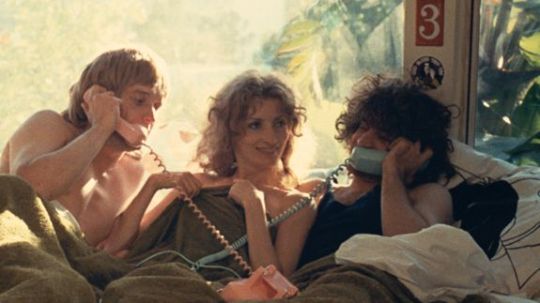
In 1967, as young people from all over America were piling into Volkswagens and Greyhound buses bound for California, Agnès Varda relocated from Paris to Los Angeles. Her husband, the director Jacques Demy, had just signed a deal with Columbia. As a mother pushing 40, she was a full generation older than the dropouts, runaways, and radicals amassing in San Francisco—and had already made a handful of classic films in France. But Varda's vivacious personality was well suited to her sunny, liberated new surroundings.
"It was a shower of freedom," she recalled in a 2009 interview with the L.A. Times. "Suddenly, everything was different. It was a peace and love time. They were trying to have sexual revolutions and colors were daring. They were eating different. I had to learn the language and we threw ourselves into the generation and we loved it so much."
Though Varda took meetings with Columbia Pictures, too, for a project titled Peace and Love, she gave up when the studio denied her full creative control. As Alison Smith points out in her book, Agnès Varda, "the disappointment was probably mitigated by the relative liberty that she had in her work. San Francisco was effervescent, flower-powered, idyllic, and Varda's contacts there read like a catalogue of the well-heeled counterculture."
Each of the three films she made during her three years in California is, in its own way, a product of that counterculture. In 1967, Varda traveled to the "aquatic suburbia" of Sausalito to make "Uncle Yanco," a lighthearted documentary short about her relative Jean Varda, a beloved local painter. The next year, in "Black Panthers," she documented the protests in Oakland following Huey P. Newton's arrest. Her sympathetic take on the movement contrasts white people's irrational fear of the Panthers with activists' calm explanations of their objectives. But her California masterpiece is 1969's Lions Love (…and Lies), a narrative feature that combines the joie de vivre of "Uncle Yanco" with the serious critique of "Black Panthers."
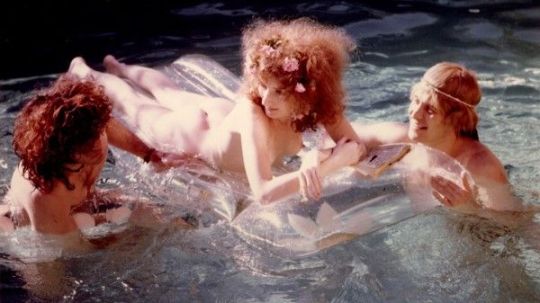
Lions Love (…and Lies) certainly paints a seductive portrait of hippie culture: the characters are beautiful young people in a beautiful setting, seeking beautiful new ways to live. Varda was not too dazzled to miss the nostalgia lurking beneath their innocence, though, which she contrasts with the ugly forces driving Hollywood and American politics. Shot months before Altamont, the Manson murders, and the release of Easy Rider, Lions Love captures a counterculture and a studio system on the verge of crumbling.
There isn't much to the plot of Lions Love. Warhol superstar Viva, who Varda had met in 1968, and Hair writer-stars James Rado and Gerome Ragni all play exaggerated versions of themselves. They've rented a light-drenched house in the Hollywood Hills, in a vague attempt to become movie stars. Explaining the film's title to Andre Cornand, in a conversation T. Jefferson Kline translated for his book Agnès Varda: Interviews, Varda said, "Actors are like lions. Indeed, they used to be called lions." But instead of doing anything as gauche as auditioning for roles, these three float naked in the pool, make phone calls in bed, watch TV, and go to parties.
They're trying to pioneer the three-way romance, though their arrangement seems born out of jadedness more than idealism. "Love is a fucking bore, sex is a fucking bore, fucking is a fucking bore, the word 'fucking' is a fucking bore," Viva drawls in an early scene. "We're looking for something else," she explains to a visitor later. "I'm tired of all this emancipation crap." Committing to their unconventional relationship would allow them to move past the chaos of free love without becoming dull. "The characters are no longer flower children. They're too old to be hippies, too young to be adults," Varda told Cornand. A sequence in which they inexplicably supervise a houseful of children underlines how unprepared they are for parenthood. At first, they enjoy the kids as playmates. But when they misbehave or need to be fed, the trio becomes frustrated. Viva quiets a toddler by pouring Dr. Pepper into his bottle.
Into this dreamy, delicate household comes a filmmaker named Shirley, played by the real underground filmmaker Shirley Clarke. She's in LA to negotiate a contract for her first studio picture—"I'm supposed to be making a movie using movie stars as real people," she explains. The moment she arrives, Viva and her boyfriends' dormant ambition awakens. They start performing for Shirley, impersonating old Hollywood divas and quoting Shakespeare. Meanwhile, three suits in a claustrophobic studio office are deciding the fate of Shirley's movie. "I can see that they're afraid of me because we're not talking about the same thing," she tells her friend Carlos (the film historian Carlos Clarens) of her interactions with the studio. And she's right. The project falls through because they're too nervous to give her final cut.
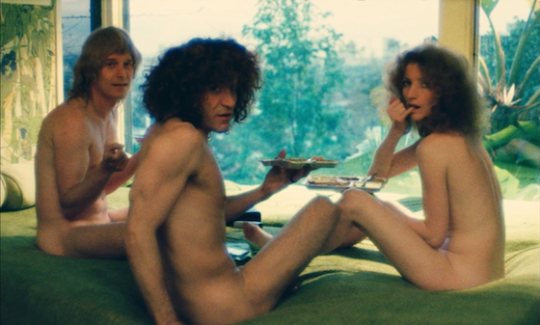
As this storyline suggests, Clarke's character is a stand-in for Varda—though one female filmmaker makes a conspicuously imperfect surrogate for the other. The film's running meta-narrative, which dramatizes the making of Lions Love and finds Varda occasionally inserting herself in the action, includes a moment where Shirley refuses to act out a scene Agnès has written for her. Devastated by her failure to secure a contract, Shirley is supposed to swallow a handful of sleeping pills. But she breaks the illusion. "I certainly wouldn't kill myself over not being able to make any goddamn movie," she protests. An exasperated Agnès throws on Shirley's tunic and acts out the scene herself, prompting Shirley to realize she's being unreasonable.
Varda's insistence on exposing the artifice of filmmaking permeates her work; in "Uncle Yanco," for instance, she takes pains to clarify that the scene where she and Jean meet is a reenactment. But the meta-narrative of Agnès Varda making a film about a director who's making a film about Hollywood is only one of many filters that color Lions Love. The story also takes place during the first week of June, 1968, when Robert F. Kennedy and Andy Warhol were shot. Before RFK's assassination, Viva, Jerry, and Jim watch TV news coverage of his campaign. "I like him because he's good-looking… in a sea of ugliness," Viva says. In her view, politicians are just more successful actors. The media coverage of his death, which Varda reproduces in long shots of the TV screen and stacks of newspaper headlines, confirms it.
Finally, toward the end of a relatively plotless film stuffed with ideas and questions, Varda brings to the fore Hollywood's nostalgia for its own heyday. Carlos gives a history lesson over shots of the photos and posters that hang in Larry Edmunds' Hollywood bookshop, a repository of memorabilia. "Hollywood's a state of mind: nostalgia," he says.
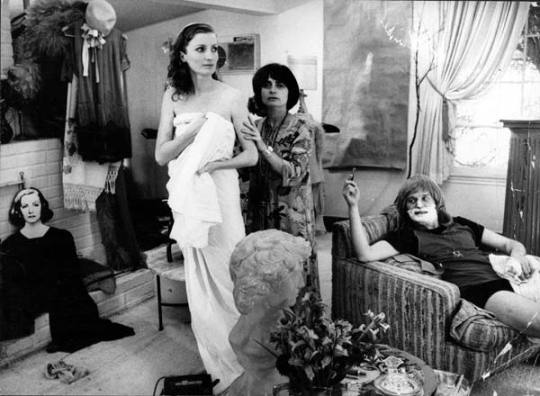
It's an idea that lingers in the background of practically every scene. Lions Love opens when the trio walks in late to a performance of Michael McClure's influential play The Beard, an imagined conversation between Jean Harlow and Billy the Kid. They come home quoting McClure, but the supposedly forward-thinking characters' obsession with old Hollywood clearly predates The Beard; they drape feather boas over every surface of their home and watch Lost Horizon, Frank Capra's 1937 adaptation of the novel that coined the term "Shangri-La." In the film's final moments, Viva looks into the camera and explains why she agreed to star in it:
I thought I would be given a script to read with lines to memorize, and I thought it would be so easy. I always wanted to do a really romantic, tragic, soap opera-type love story movie with memorized lines such as, "Oh, darling, I didn't know you had cancer. What are we going to do now?"
She says she's sick of being shown naked or raped, and of delivering monologues like this one. So she decides to simply sit and breathe for a full minute, ending the film with a moment of pure cinema that's clearly meant to echo Andy Warhol's screen tests—moving portraits that simultaneously reproduce and deconstruct Hollywood glamour.
Warhol was certainly on Varda's mind while she was making Lions Love. In his book Greenhorns: Foreign Filmmakers Interpret America, Norman Kagan quotes her as saying that "the only movies I saw in Hollywood I liked were Andy's movies." Speaking to Kelly Conway, for her book Agnès Varda, the director noted that "there was a big shift in my work, when I discovered the California counterculture"; she began making "features that were very different from my films shot in France." Along with taking cues from the hippies, Varda's California films drew stylistic inspiration from the free-form aesthetics of American underground cinema. Though Lions Love is almost two hours long, its script was only 28 pages and began with a note advising that the film would be "more improvised than written."
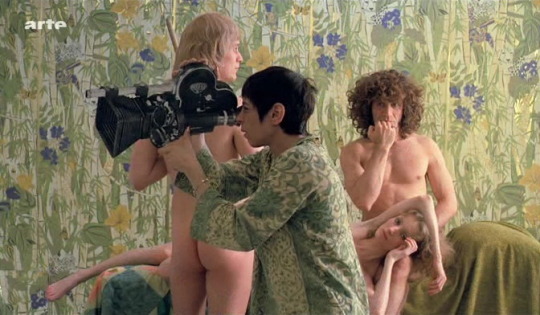
Critics picked up on the Warhol influence, but couldn't appreciate the tightly woven web of ideas underlying the loose plot of a film Varda often described as a collage. "Director Agnès Varda presents her fascination with the banal myth and mania that is Southern California," wrote a Variety critic who seemed to prefer Warhol's less complicated movies. "The result is a pleasant, sometimes humorous blend of style and technique that ultimately is unsuccessful." In a mixed but condescending Times review, Vincent Canby called Lions Love "very funny, not much different from a television situation comedy" and despaired at the serious turn it takes after Shirley swallows the pills. "There is so much that is so pleasant in Lions Love that I wish Miss Varda hadn't tried to give it a larger significance, which—I'd like to add at the risk of sounding chauvinistic — seems paradoxically very naive and very French intellectual," Canby wrote. (In the same review, he offered the additional chauvinistic opinion that Varda's "French films Cleo from 5 to 7 and Le Bonheur aspired to a seriousness never successfully communicated.")
Even today, some critics mistake Varda's playfulness for naivety or optimism. In an otherwise convincing 2016 Studies in French Cinema article titled "Explaining Lions Love," J. Brandon Colvin wrote, "Her perspective on stardom/celebrity is almost utopian in its positivity, especially when compared to Warhol's cynicism." Her dive into Hollywood nostalgia, and the scenes where bean counters decide the fate of Shirley's film, contradict that interpretation. As The New Yorker's Richard Brody recently noted, "It was an industry in a state of deliquescence, and Varda saw rightly that, if Hollywood were to become solid again, it would do so in open acknowledgment of and confrontation with its own past. This, of course, would be the film-school neoclassicism of the New Hollywood." Varda's implication is that stardom as conceived and clung to by studios is outdated—it's as much of a trap for Viva, Jim, and Jerry as marriage, and they don't quite realize it's already ensnared them.
Rather than resisting this system, like Shirley and (in real life) Varda, these young New York hippies are so desperate to be absorbed by it that their professional jealousy even bleeds into their political views. Instead of openly chasing fame, they exhaust themselves by maintaining a transgressive lifestyle in a film industry—and a society—that still hasn't learned to value the avant-garde. Their fatigue presages the decadence and hysteria that took hold in the final months of the '60s. Lions Love is a funny, sun-bleached film that follows the charming antics of three young people who are (or are at least trying to be) in love. It's also a movie about three aspiring celebrities whose ambition brings them to Hollywood, where they become isolated by their reluctance to court success and then watch their icons get shot. In that light, it looks less like an uncritical celebration of the counterculture Varda fell in love with than a wistful requiem for it, from an artist who really did sacrifice fame for freedom.
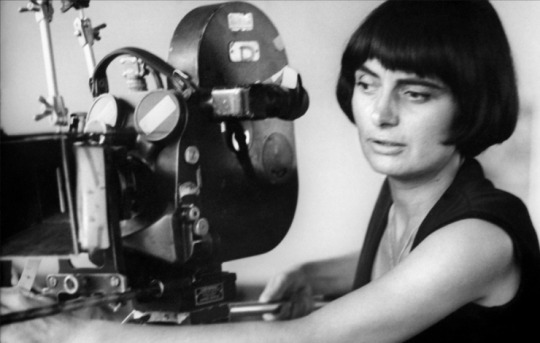
Source: https://store.oscilloscope.net/blogs/musings-oscilloscope-labs/bohemian-requiem-how-agnes-varda-s-lions-love-and-lies-presaged-the-death-of-the-hippie-and-the-rebirth-of-hollywood-by-judy-berman
0 Response to "Mick and Agnes Sir Lion of Beef"
Post a Comment